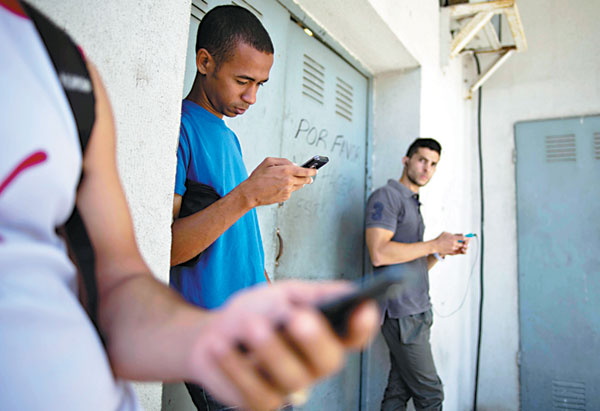Cuba accuses US of subverting govt
Updated: 2014-04-08 07:12
By Agencies in Havana (China Daily)
|
||||||||
 |
|
Students look for an Internet signal for their smartphones in Havana on Tuesday. [Photo/Agencies] |
Washington denies defunct Twitter-like service 'covert'
Cuba said on Sunday the United States continues to use social media to "subvert" the island's government and that last week's revelation of a US-created, Twitter-like service for Cuba was just one of several examples.
The Associated Press reported on Thursday that the US Agency for International Development had created a social media network in Cuba that snared cellphone users with the aim of mobilizing anti-government demonstrations.
The US government has admitted to creating ZunZuneo, which takes its name from the Cuban slang for the tweet of a hummingbird. The program, built by the US Agency for International Development using shell companies to hide US government involvement, went dark in 2012 due to a lack of funds.
US officials confirmed the program on Thursday, calling ZunZuneo a "democracy promotion" program that was neither "secret" nor "covert" under the US government's definitions of those terms.
'Tip of the iceberg'
However, Juventud Rebelde, the newspaper of Cuba's Union of Young Communists, reported on Sunday that ZunZuneo was just one of several covert projects sponsored by the US to destabilize the island nation.
"The surprising denunciations made recently in an investigation by the AP, about the existence for years of a secret project of the US Agency for International Development to create a supposed Cuban Twitter, ... are scarcely the tip of the iceberg of a gigantic subversive campaign against Cuba," the newspaper reported.
One program was created by the US State Department's Office of Cuba Broadcasting, which broadcasts radio and television signals into Cuba that are mostly jammed by the local authorities. OCB programs such as TV and Radio Marti are named after the island's independence hero Jose Marti.
The OCB's online project, Martinoticias, aims to get around the jamming by using social media. Since 2011, Martinoticias has been spamming cellphone users in an attempt to promote its services, the newspaper said.
Juventud Rebelde also referred to an initiative known as Piramideo, which the OCB publicly announced upon its inception in June 2013.
The newspaper quoted Hilda Arias, director of mobile services at ETECSA, Cuba's telecommunications company, as saying Piramideo was designed to provide a communication channel between opposition groups and dissidents.
Cuba has the lowest Internet density in the Western Hemisphere, and the government is slowly allowing increased Internet access, all the while warning of "enemies" using social media to foster unrest. But there are over 2 million cellphone users in Cuba, where people actively use text messaging.
US officials said the programs were merely an attempt to promote the free flow of information.
"There's nothing covert about either of these US government programs. ... USAID's appropriations are public information, and the Congressional Budget Justification describes the government's Cuba programs," USAID spokesman Matthew Herrick said in an e-mail.

 Vigil marks one month since MH370 vanished
Vigil marks one month since MH370 vanished
 The world in photos: March 31-April 6
The world in photos: March 31-April 6
 Simply child's play
Simply child's play
 Photo special: Weird buildings in China
Photo special: Weird buildings in China
 Jackie Chan holds charity concert marking 60th birthday
Jackie Chan holds charity concert marking 60th birthday
 Microsoft to end support for Windows XP
Microsoft to end support for Windows XP
 Poor weather greets baby prince
Poor weather greets baby prince
 22 miners trapped in Yunnan coal mine flood
22 miners trapped in Yunnan coal mine flood
Most Viewed
Editor's Picks

|

|

|

|

|

|
Today's Top News
Chinese, US defense chiefs begin talks
Time runs short in MH370 hunt
US warns China over yuan
Hagel's insensible remarks
Japan, US differ in alliance expectations
Pro-Russians declare independence in Donetsk
China tours by Pentagon chiefs
Chinese military institutions visited by US officials
US Weekly

|

|







